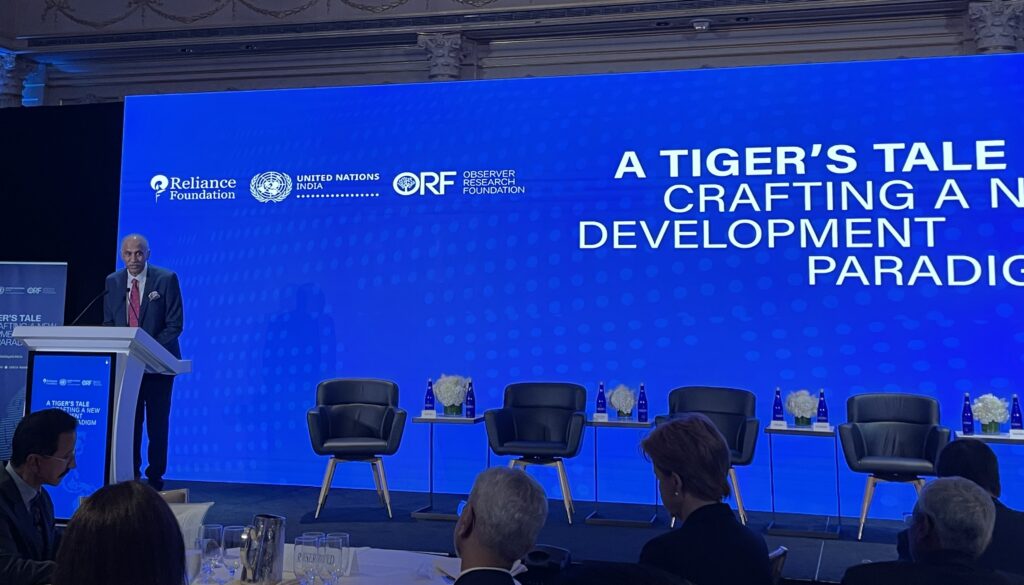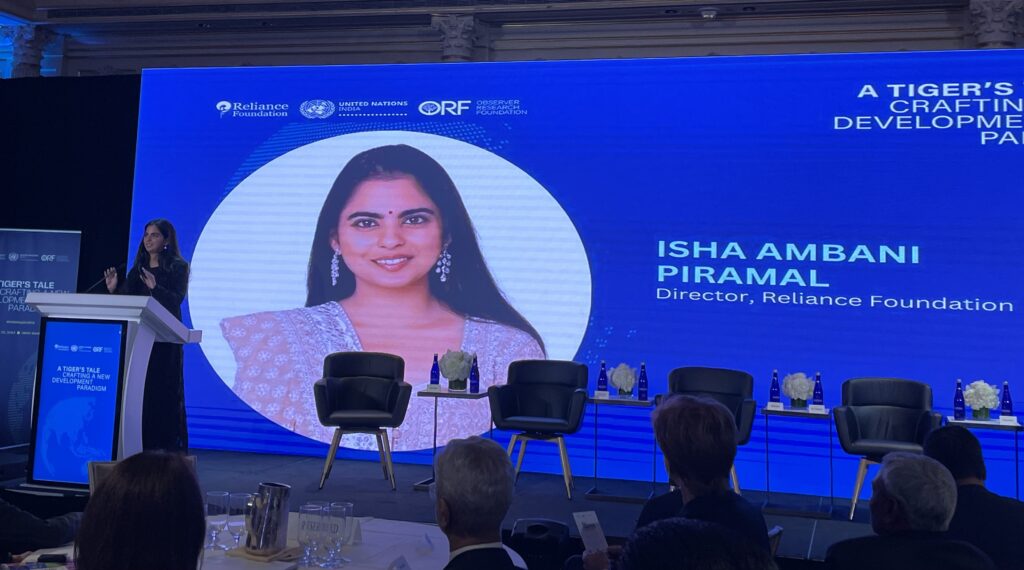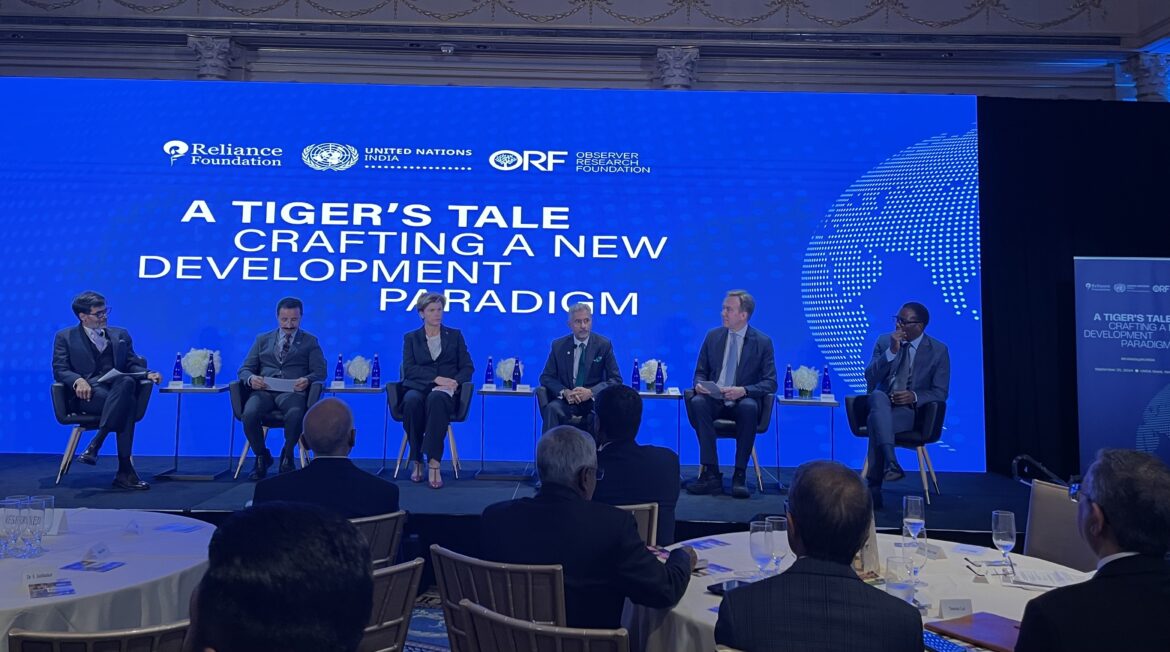On the sidelines of the 79th Session of the United Nations General Assembly, the Reliance Foundation in partnership with the Observer Research Foundation (ORF), the United Nations in India, and the Permanent Mission of India to the United Nations, hosted a high-level panel discussion, “A Tiger’s Tale: Crafting A New Development Paradigm,” on September 25, 2024, at the JW Marriott Essex House in New York.
Welcoming the guests, President of ORF and the event’s moderator, Samir Saran, mentioned that ORF and the Reliance Foundation have been collaborating to bring together thought leaders, political figures, industries, and civil society to discuss critical issues shaping the future of development.
He noted, “We are now at a different moment. This can change, must change, and may change. The rise of the Global South and the significance of the emergence of large economies from this group allows us, for the first time, the ability to write our own futures, script our solutions, help our communities and in the near future, even find our endeavors together.”
To a question about impact of brand India around the world, India’s Foreign Minister S. Jaishankar remarked that “Brand India is doing well. It’s doing better,” while reflecting on the country’s progress over the years. He highlighted that India has gained respect politically, economically, and technologically, pointing out to India’s achievements, mentioning the moon landing, digital infrastructure, vaccines, innovative startups, and the country’s growing prominence in other sectors.
Speaking about India’s image at the United Nations, Jaishankar referred to a “sentiment respect,” that reflects India’s reputation as a country with a heart, demonstrating compassion for other nations and peoples. He believes this sentiment is most clearly seen in India’s efforts to bring the Global South back into global conversations.
On ambitions concerning multilateralism and the transformation of global governance, Jaishankar expressed the need for genuine global development that promotes national diversity. He stressed the importance of democratizing economics, pointing out that over-concentration and reliance on limited geographies, is problematic. He emphasized the need for production to be spread across various regions to achieve a more equitable world.
Jaishankar also underlined the necessity of democratizing technologies, citing the role of Digital Public Infrastructure in achieving this goal. Additionally, he spoke about the need to democratize the global workforce, noting a “There is a demographic mismatch today where there’s demand, there isn’t enough supply.” He called for a solution to address this imbalance in a structured and acceptable manner.
Regarding his recent travels to Russia, Ukraine, and other countries, Jaishankar affirmed, “Yes, we are,” when asked if India is investing in peace efforts. He highlighted the two major ongoing conflicts: the war in Ukraine, now in its third year, and the conflict in Gaza, which will soon mark its second year.
Amid these challenges, he stressed the importance of assessing whether countries are willing to take a more active role in addressing these crises. “I think we have decided that we would. It’s reasonable, it’s responsible to do something about it,” he said, emphasizing that his recent travels are part of that commitment.
About America’s general elections, Jaishankar recalled that over the last four years, he has found “significant amount of bipartisan consensus, especially on national security and foreign policy matters,” adding there are high elements of continuity especially in the Indo-Pacific region.
On the topic of America’s upcoming general elections, Jaishankar conveyed it’s “a very polarized election.” However, over the past four years, he has observed a “significant amount of bipartisan consensus, especially on national security and foreign policy matters.” He pointed out that there has been strong continuity in key areas, particularly in the Indo-Pacific region.
According to him, after 2016 elections, he also noted a shift toward greater American realism, stating, “I would argue that probably that’s good for the world.” This realism, he explained, helps foster an understanding of each nation’s strengths, laying the groundwork for more effective collaboration.

Permanent Representative of India to the United Nations, P Harish stressed that “There was an intense need for a reboot for the development paradigm for the whole globe,” and that prompted the assembly of global leaders including Prime Minister Narendra Modi for the Summit of the Future in New York.
He highlighted that due to the impact of the pandemic and multiple global conflicts over the past two years, many of the Sustainable Development Goals (SDGs) outlined in the 2030 Agenda have not been achieved.
“In the various Voice of the Global South Summit convened by my Prime Minister over the last two years, the single cry of help that came out from various countries of the global south was focused on the problems faced due to debt and the triple problems of food inflation, fuel, and fertilizer inflation,” added Ambassador Harish. “Yet a coordinated approach from the international community and the multilateral system was not forthcoming. It was under these circumstances that all of us, all nations, cooperated together to come out with this Pact for the Future.”

In her address, Director of the Reliance Foundation, Isha Ambani Piramal, said “India in particular, is stepping into its rightful place, shaping the new global order. But this moment is more than just about change. It’s about creating a better future together, especially for our youth, the challenges we face are many, but by working together, we can make real progress.”
Expressing her pleasure in representing the Reliance Foundation, Piramal noted that the event was appropriately titled Tiger’s Tale. She emphasized that in India, “we worship Goddess Durga,” who rides a Tiger and symbolizes Shakti, meaning strength, which protects and promotes all that is good in the world.
Piramal further emphasized that at the Reliance Foundation, they are working with determination to secure “a more inclusive future for the next generations of India.” She outlined five key strategies the Foundation is focused on: empowering women, unlocking the potential of youth, fostering partnerships and innovation, leveraging digital technologies, and crafting a bold vision for the future.
Minister for Foreign Affairs, Latvia, Baiba Braže, President, World Economic Forum, Borge Brende, Minister of Foreign Affairs, Guyana, Hugh Hilton Todd, Group Chairman and Chief Executive Officer, DP World, Sultan Ahmed bin Sulayem, also participated in the discussion.
Board Member of ORF, B. Srinivasan, delivered the vote of thanks.






